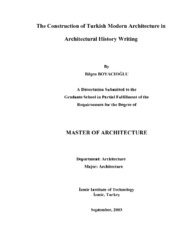Please use this identifier to cite or link to this item:
https://hdl.handle.net/11147/3734Full metadata record
| DC Field | Value | Language |
|---|---|---|
| dc.contributor.advisor | Erkarslan, Özlem | - |
| dc.contributor.author | Boyacıoğlu, Bilgen | - |
| dc.date.accessioned | 2014-07-22T13:52:15Z | - |
| dc.date.available | 2014-07-22T13:52:15Z | - |
| dc.date.issued | 2003 | - |
| dc.identifier.uri | http://hdl.handle.net/11147/3734 | - |
| dc.description | Thesis (Master)--İzmir Institute of Technology, Architecture, İzmir, 2003 | en_US |
| dc.description | Includes bibliographical references (leaves: 108-111) | en_US |
| dc.description | Text in English; Abstract: Turkish and English | en_US |
| dc.description | vi, 111 leaves | en_US |
| dc.description.abstract | This study concentrates on architectural historiography, which functions as an independent medium of activity and production within the discipline of architecture and affects architectural practice directly or indirectly. Historiography, which has been handled as one of the realms of discourse production, has been evaluated in terms of the formation of conditions in the framework of this study. Besides restrictions that stem from discourse's own structure, the compelling factors, which are caused by these formative conditions, have been examined, and extant methods to overcome these problems have been discussed in the realm of architectural historiography. In this framework, this study claims that history writing of architecture has to be handled in terms of its own epistemology in order to attain efficacy. The study aims at evaluating the historiography of Turkish modern architecture in the frame of the phenomenon of an emergent discourse as the indicator of the nation-state ideology and its exclusions.Within the scope of the study, the historiography of Turkish modern architecture has been evaluated critically, and different conceptions of modernity have been interrogated. The concept of modernity, which is a self-generating social process that started in the Ottoman Empire, and the concept of modernity, which was produced by nation-state ideology and based on the physical indicators of the process of Western modernization, have been comparatively evaluated in terms of how they handled the realm of architectural historiography. The study argues critically that one of the two different architectural practices, which were developed the different conceptions of modernity, found focus on in architectural historiography. Thus the other was excluded.As a result of this evaluation, the study proposes that a different architectural historiographic method, which includes what was so far been the excluded, has to be developed.Keywords: historiography, architectural historiography, modernism, nation-state, historiography of Turkish modern architecture. | en_US |
| dc.language.iso | en | en_US |
| dc.publisher | Izmir Institute of Technology | en_US |
| dc.rights | info:eu-repo/semantics/openAccess | en_US |
| dc.subject.lcc | NA190. B78 2003 | en |
| dc.subject.lcsh | Architecture--Historiography | en |
| dc.subject.lcsh | Modern movement (Architecture) | en |
| dc.subject.lcsh | Architecture--Turkey--History | en |
| dc.title | The Construction of Turkish Modern Architecture in Architectural History Writing | en_US |
| dc.type | Master Thesis | en_US |
| dc.institutionauthor | Boyacıoğlu, Bilgen | - |
| dc.department | Thesis (Master)--İzmir Institute of Technology, Architecture | en_US |
| dc.relation.publicationcategory | Tez | en_US |
| dc.identifier.wosquality | N/A | - |
| dc.identifier.scopusquality | N/A | - |
| item.openairetype | Master Thesis | - |
| item.cerifentitytype | Publications | - |
| item.grantfulltext | open | - |
| item.openairecristype | http://purl.org/coar/resource_type/c_18cf | - |
| item.fulltext | With Fulltext | - |
| item.languageiso639-1 | en | - |
| Appears in Collections: | Master Degree / Yüksek Lisans Tezleri | |
Files in This Item:
| File | Description | Size | Format | |
|---|---|---|---|---|
| T000289.pdf | MasterThesis | 1.74 MB | Adobe PDF |  View/Open |
CORE Recommender
Items in GCRIS Repository are protected by copyright, with all rights reserved, unless otherwise indicated.